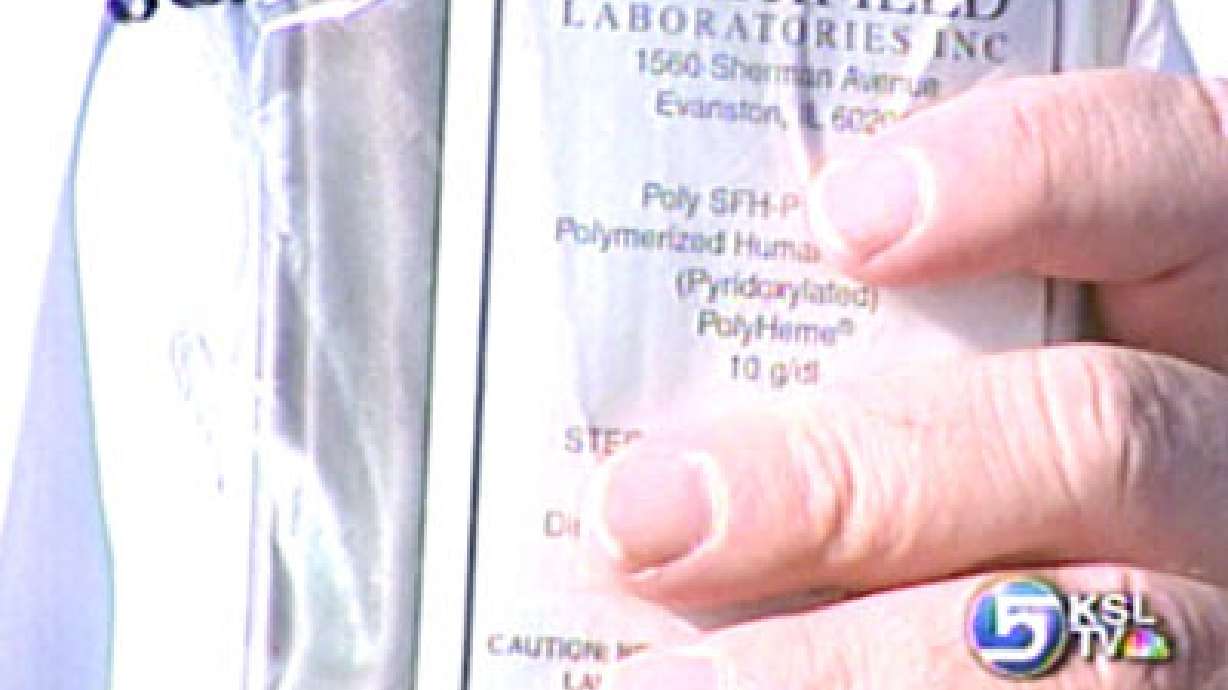Estimated read time: 3-4 minutes
This archived news story is available only for your personal, non-commercial use. Information in the story may be outdated or superseded by additional information. Reading or replaying the story in its archived form does not constitute a republication of the story.
SALT LAKE CITY (AP) -- Two Utah hospitals stopped their participation in a national clinical study in which synthetic blood is administered to some trauma patients.
They did so after reports that the maker of PolyHeme had withheld information about an earlier study.
University Hospital restarted its PolyHeme study Friday.
LDS Hospital's study remained suspended, pending a decision by its institutional review board, said Mark Stevens, chief of trauma services.
Testing was halted Feb. 23 after the Wall Street Journal reported Northfield Laboratories tried to hide crucial details about a 2000 blood-substitute study. The Journal said that 10 heart surgery patients in that experiment had heart attacks, while patients given real blood did not.
The Utah trials began in December, but no one has received PolyHeme yet.
Stephen Morris, University Hospital's trauma director and principal investigator for the trial, said he is satisfied with Evanston, Ill.-based Northfield Laboratories' conclusion "that there are no specific cardiovascular or other adverse outcomes that would jeopardize the safety of the (current) study."
Northfield denied hiding results of the previous study.
It halted that study and has not published the full results, but Northfield Chairman Steven Gould said PolyHeme didn't cause the heart attacks or disproportionately more deaths. He said the study was stopped because enrollment was declining and the company wanted to focus on trauma research.
The company's previous study -- from 1998 to 2000 -- involved hospitalized patients with defective heart arteries who consented to get Polyheme.
In the current study, trauma victims may get PolyHeme or saline fluid on the way to the hospital. Once there, PolyHeme treatment might continue for up to 12 hours, while those on saline would get blood transfusions.
Thirty-one trauma centers in 18 states are enrolled in the study. Preliminary results are expected later this year.
Of the 720 patients expected to participate, up to 36 will be from Utah. Half are to receive the synthetic blood and the other half are to get the current emergency treatment, such as saline solution.
Because the patients may not be able to give consent, anyone who wants to be excluded can wear a bracelet provided by the hospitals. The trauma study was approved under a federal "informed consent" exemption that applies to emergency research.
So far, 395 bracelets have been issued to people who don't want to be part of the study, said University Hospital spokesman Chris Nelson.
Of those, 195 were requested by individuals and 200 were part of a courtesy distribution to Seventh-day Adventist, Christian Scientists, Jehovah's Witnesses and similar churches and organizations that may object to the treatment.
The current study should never have begun, said Nancy M.P. King, a University of North Carolina ethicist who co-authored articles for an ethics journal. She and colleagues wrote that real blood shouldn't be withheld from people who need it without their consent.
The ethicists say the problem with the study is when the patients arrive at the hospital. Testing Polyheme against blood should be done separately in patients who can give consent or who have family members who can consent, wrote King and University of Hawaii ethicist Ken Kipnis and Philadelphia anesthesiologist Dr. Robert Nelson.
(Copyright 2006 by The Associated Press. All Rights Reserved.)









